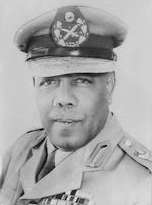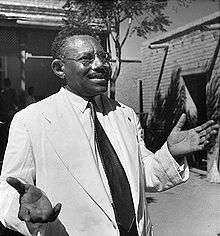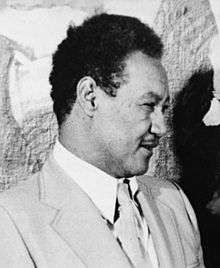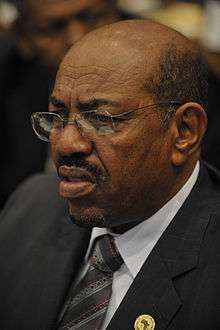List of heads of state of Sudan
| President of the Republic of Sudan جمهورية السودان | |
|---|---|
|
| |
| Residence |
Republican Palace Khartoum, Sudan |
| Term length | 5 years, renewable indefinitely |
| Inaugural holder | Five-member Sovereignty Council (collective presidency) |
| Formation | 1 January 1956 |
| Deputy | Vice President of Sudan |
| Website |
www |
 |
| This article is part of a series on the politics and government of Sudan |
| Constitution |
|
Judiciary
|
|
|
Related topics
|
This is a list of heads of state of Sudan, from the independence of the country in 1956 to the present day.
History of the office
Since the country's independence on 1 January 1956, six individuals (and three multi-member sovereignty councils) have served as head of state of Sudan, currently under the title President of the Republic of Sudan. Prior to independence, Sudan was governed as a condominium by Egypt and the United Kingdom, under the name Anglo-Egyptian Sudan. As such, executive power was vested in a dyarchy consisting of both countries' heads of state – at the time of independence, the Queen of the United Kingdom (Elizabeth II) and the Egyptian Revolutionary Command Council (headed by Gamal Abdel Nasser). Immediately following independence, the role of head of state was filled by a five-member Sovereignty Council, with rival nationalist factions unable to agree on a single candidate. In November 1958, General Ibrahim Abboud led a military coup d'état, assuming the role of head of state as Chairman of the Supreme Council. Assuming the title of president in 1964, he resigned later that year due to general discontent around the rule of the military regime. Abboud was succeeded by a senior civil servant, Sirr Al-Khatim Al-Khalifa, who served as acting president for 18 days before transferring executive authority to a Committee of Sovereignty.
Ismail al-Azhari, the leader of the National Unionist Party, was made president in July 1965, and ruled with limited power until he was deposed in 1969. The military officers responsible for the coup established the National Revolutionary Command Council, chaired by Gaafar Nimeiry. Nimeiry, the leader of the newly formed Sudanese Socialist Union, assumed the position of president in 1971, and subsequently established a one-party state, which existed until 1985, when a group of military officers overthrew his government and established the Transitional Military Council, led by Lieutenant-General Abdel Rahman Swar al-Dahab. Ahmed al-Mirghani succeeded to the relatively powerless position of Chairman of the Supreme Council in 1986, after multi-party elections held that year. He was deposed in a 1989 military coup led by Lieutenant-General Omar al-Bashir. Al-Bashir has served as head of state since the coup, under the title of Chairman of the Revolutionary Command Council for National Salvation to 1993 and as president from 1993 onwards (and from 1996 as the leader of the National Congress Party).
Heads of State of Sudan (1956–present)
(Dates in italics indicate de facto continuation of office)
| № | Name | Birth–Death | Took office | Left office | Political Party | ||
|---|---|---|---|---|---|---|---|
| 1 | Sovereignty Council Members: Abdel Fattah Muhammad al-Maghrabi Muhammad Ahmad Yasin Ahmad Muhammad Salih Muhammad Othman al-Dardiri Siricio Iro Wani |
1 January 1956 | 17 November 1958 | — | |||
| Chairman of the Supreme Council | |||||||
| 2 | Ibrahim Abboud |  |
1900–1983 | 18 November 1958 | 31 October 1964 | Military | |
| Presidents | |||||||
| Ibrahim Abboud |  |
1900–1983 | 31 October 1964 | 16 November 1964[1] | Military | ||
| — | Sirr Al-Khatim Al-Khalifa Acting President |
 |
1919–2006 | 16 November 1964 | 3 December 1964 | National Umma Party | |
| 3 | First Committee of Sovereignty Members: Abdel Halim Muhammad Tijani al-Mahi Mubarak Shaddad Ibrahim Yusuf Sulayman Luigi Adwok Bong Gicomeho |
3 December 1964 | 10 June 1965 | — | |||
| 4 | Second Committee of Sovereignty Members: Ismail al-Azhari Abdullah al-Fadil al-Mahdi Luigi Adwok Bong Gicomeho Abdel Halim Muhammad Khidr Hamad |
10 June 1965 | 8 July 1965 | — | |||
| Chairman of the Sovereignty Council | |||||||
| 5 | Ismail al-Azhari |  |
1900–1969 | 8 July 1965 | 25 May 1969[2] | Democratic Unionist Party | |
| Chairman of the National Revolutionary Command Council | |||||||
| 6 | Gaafar Nimeiry |  |
1930–2009 | 25 May 1969 | 12 October 1971[3] | Military / Sudanese Socialist Union | |
| President | |||||||
| Gaafar Nimeiry |  |
1930–2009 | 12 October 1971 | 6 April 1985[4] | Military / Sudanese Socialist Union | ||
| Commander-in-Chief | |||||||
| 7 | Abdel Rahman Swar al-Dahab |  |
1934– | 6 April 1985 | 9 April 1985 | Military | |
| Chairman of the Transitional Military Council | |||||||
| Abdel Rahman Swar al-Dahab |  |
1934– | 9 April 1985 | 15 December 1985 | Military | ||
| Chairman of the Transitional Military Council | |||||||
| (7) | Abdel Rahman Swar al-Dahab |  |
1934– | 15 December 1985 | 6 May 1986 | Military | |
| Chairman of the Supreme Council | |||||||
| 8 | Ahmed al-Mirghani |  |
1941–2008 | 6 May 1986 | 30 June 1989[5] | Democratic Unionist Party | |
| Chairman of the Revolutionary Command Council for National Salvation | |||||||
| 9 | Omar al-Bashir |  |
1944– | 30 June 1989 | 16 October 1993 | Military / National Congress | |
| President | |||||||
| Omar al-Bashir |  |
1944– | 16 October 1993 | Incumbent | Military / National Congress | ||
Latest election
| Candidate | Party | Votes | % |
|---|---|---|---|
| Omar al-Bashir | National Congress | 5,252,478 | 94.05 |
| Fadl el-Sayed Shuiab | Federal Truth Party | 79,779 | 1.43 |
| Fatima Abdel Mahmoud | Sudanese Socialist Democratic Union | 47,653 | 0.85 |
| Mohamed Al Hassan | National Reform Party | 42,399 | 0.76 |
| Abdul Mahmoud Abdul Jabar Rahamtalla | Union of the Nation's Forces | 41,134 | 0.74 |
| Hamdi Hassan Ahmed | Independent | 18,043 | 0.32 |
| Mohamed Ahmed Abdul Gadir Al Arbab | Independent | 16,966 | 0.30 |
| Yasser Yahiya Salih Abdul Gadir | Independent | 16,609 | 0.30 |
| Khairi Bakhit | Independent | 11,852 | 0.21 |
| Adel Dafalla Jabir | Independent | 9,435 | 0.17 |
| Mohamed Awad Al Barow | Independent | 9,388 | 0.17 |
| Asad Al Nil Adel Yassin Al Saafi | Independent | 9,359 | 0.17 |
| Alam Al Huda Ahmed Osman Mohamed Ali | Independent | 8,133 | 0.15 |
| Ahmed Al Radhi Jadalla Salem | Independent | 7,751 | 0.14 |
| Isaam Al Ghali Tajj Eddin Ali | Independent | 7,587 | 0.14 |
| Omar Awad Al Karim Hussein Ali | Independent | 6,297 | 0.11 |
| Invalid/blank votes | 506,549 | – | |
| Total | 6,091,412 | 100 | |
| Registered voters/turnout | 13,126,989 | 46.40 | |
| Source: NEC | |||
See also
Notes
- ↑ Resigned after mass protests
- ↑ Deposed in the 1969 coup d'état
- ↑ Briefly interrupted during the 19–22 July 1971 coup d'état
- ↑ Deposed in the 1985 coup d'état
- ↑ Deposed in the 1989 coup d'état
